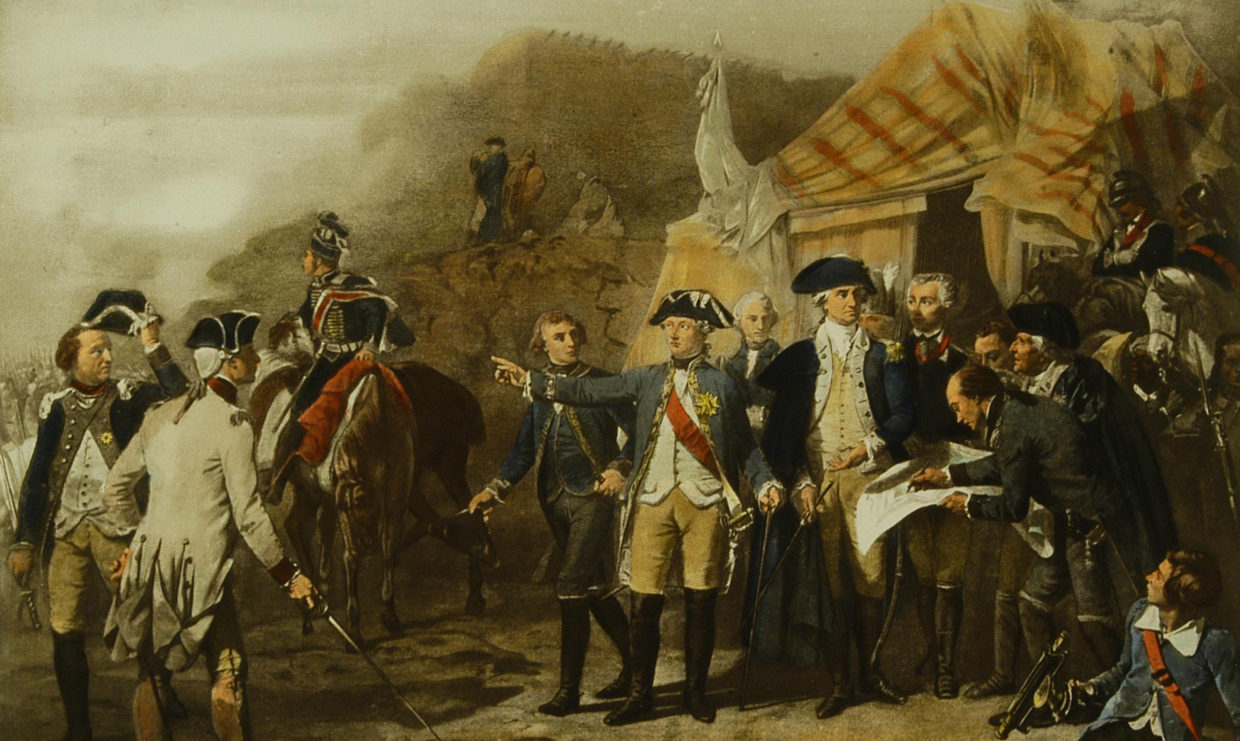The Slow Build Up to the American Revolution
T. H. Breen on the Philosophies Behind America's War for Independence
David Ramsay, a Continental officer who wrote a brilliant history of the Revolution, understood as well as any contemporary what was happening. He marveled how the war transformed traditional social relations. According to Ramsay, the conflict with Great Britain
called forth many virtues, and gave occasion for the display of abilities which, but for that event, would have been lost to the world. When the war began, the Americans were a mass of husbandmen, merchants, mechanics, and fishermen; but the necessities of the country gave a spring to the active powers of the inhabitants, and set them to thinking, speaking and acting in a line far beyond that to which they had been accustomed.
What we call the American Revolution cannot be linked to a single moment such as the signing of the Declaration of Independence. Rather, it was a gradual shift in popular thinking about the relation between ordinary people and government power. The revolution was a process, contingent and open—ended, a complex move from revolution to Revolution. The new men took charge of community affairs before they became revolutionaries, before most of them even openly advocated national independence. They were caught up by the sudden collapse of British authority outside a few major port cities. They learned on the job, gaining a measure of self-confidence through the daily challenge of policing politically suspicious neighbors, recruiting Continental soldiers, overseeing the local militia, collecting taxes, and supplying soldiers with food and blankets.
It was this common experience that allows us to generalize about revolutionary voices. To be sure, we recognize profound regional differences, some greater than others. South Carolina was not Massachusetts. Moreover, records in the South are not as full as those surviving in the Middle States and New England. We might note religious and economic variations or contrasting racial statistics. But such distinctions and uneven records should not discourage us from looking at the Revolution as a whole. After all, one can examine resistance in local communities, while at the same time making broad generalizations about a revolutionary people at war.
The revolutionary journey of the American people occurred in stages, discrete moments, each in its own way threatening and demanding. It involved a series of adjustments to a constantly changing political situation. Almost no one in 1775 called either for independence from Great Britain or for the rejection of monarchy. They wanted in the first instance only to persuade the British Parliament to repeal acts that demanded colonial taxation without representation—in a word, to reform an imperial system that suddenly seemed oppressive.
A second, entirely separate moment occurred after the British refused to back down. Parliamentary intransigence created a situation in which petitioning and nonviolent protest gave way to armed resistance. Once the war began, communities throughout America faced an entirely different set of problems—funding, recruiting, and policing. Later in the controversy—certainly after 1778—severe financial strains triggered by inflation raised the possibility that the enemies of political liberation were in fact other Americans, war profiteers and speculators who betrayed the common good.
The American Revolution was a gradual shift in popular thinking about the relation between ordinary people and government power.During the course of this evolving political crisis, a colonial rebellion gave birth to a genuine revolution. Although the precise moment varied from region to region, there can be no doubt that the transformation brought forth a new political culture. The driving force behind the creation of a regime based on the will of the people can be found in the quotidian experiences of managing local affairs, of actually participating in a political system in which ordinary Americans found that they had to negotiate power with other ordinary Americans, people who insisted that they were as good as any other member of civil society, in essence discovering a powerful sense of mutual equality that remains the rhetorical foundation of our political culture. A government by the people was not something that the revolutionaries could take for granted; it had to be discovered and then reaffirmed by living through a challenging period of political change.
Throughout the war, the people we shall encounter explained and justified their actions in strikingly different ways from how the celebrated Founders did so. While the nation’s leaders—members of the Continental Congress, for example—framed the controversy with Great Britain largely in an abstract language of constitutional law and political theory, revolutionaries (a term we shall use instead of patriots) in small communities and seaports seldom linked their support of the Revolution to leading political thinkers of the Italian Renaissance or English Civil Wars. Largely absent from their statements were references to political philosophers such as Montesquieu or Harrington. Ordinary revolutionaries may have read these texts, but when called upon to declare what they believed and why they believed it, they rarely drew upon the same intellectual traditions as the men who drafted the pamphlets that shape our modern understanding of revolution and nationhood.
The assumptions and beliefs that energized the Revolution on the local level can be recovered in the records of town meetings—forums in which people worked out ideas about political power—in weekly newspapers, and in countless sermons that schooled communities throughout America about the character of just wars, the moral obligation to resist tyranny, and the responsibility of a covenanted people to preserve God-given rights from despots. The declarations were simple and direct.
Old Testament stories about the punishments visited on the Jews when they failed to heed the Lord’s admonitions complemented examples of betrayal and heroism encountered in secular histories. As David Ramsay explained in 1789, the revolutionaries closely studied the Old Testament. Here, they learned that the Jews had made a terrible mistake when they appealed to the Lord for a king. As Americans interpreted biblical lessons, “even the name of a king was rendered odious” and “Hereditary succession was turned into ridicule.”
These popular ideas helped turn complaints about taxes and representation into armed resistance against Great Britain. That is a key distinction. We are exploring the fundamentals for revolutionary mobilization, retrieving explanations for personal sacrifice. The central element in justifying violence was the deeply personal conviction that if one did not take an active stand against tyranny, one thereby offended God. Accepting despotism was not simply an act of cowardice; it was sin. This religiously driven sense of political responsibility was not the perspective of the Founders, students of the Enlightenment. But in the larger revolutionary society a scriptural message resonated persuasively with the American soldiers and with the communities that sent them to war.
As respected members of small communities, ministers provided guidance in spiritual matters. They also spoke to parishioners about political concerns. Did God condone rebellion? What did the Bible say about neutrality in the fight against oppression? Should one forgive an enemy who has inflicted pain on the community? Unless we grasp the revolutionary challenge as congregations throughout America would have interpreted them, we will fail to understand why these revolutionaries took oaths on the Bible so seriously or why they frequently offered domestic political enemies a chance of redemption and reconciliation through public confession.
Restoring the voices of ordinary people to the story of the Revolution requires an additional element. After all, abstract and highly intellectualized ideas about public virtue and vigilance—sometimes seen as the driving force of revolution—were not sufficient to trigger or sustain resistance. Something more was needed, an additional catalyst. Revolutions require passion.
What we often forget—although any contemporary news report about insurgencies throughout the world would clarify our historical understanding—is that during our own revolution assumptions and beliefs about the exercise of political power were amplified by raw emotions such as anger and hate. Accepting the emotional base of revolutionary resistance does not lessen the achievements of the founding generation. To the contrary, it makes them more human. As the Reverend Henry Cumings explained in a sermon delivered in Lexington, Massachusetts—to a congregation that included families who had recently lost sons and fathers in the battle of April 19, 1775—“Though rage, and inflamed wrath, are no essential properties of patriotism; yet patriotism, without feeling or sensibility, is a mere name.”
Ordinary revolutionaries may have read the philosophers that the Founders quoted, but when called upon to declare what they believed and why they believed it, they rarely drew upon the same intellectual traditions.By restoring passions to the narrative of the Revolution, we gain a strikingly different perspective on the origins of American political culture. Instead of an event-driven story, one that sweeps us smoothly along from the Stamp Act crisis of 1765 to the Declaration of Independence and to the peace treaty of 1783, we will recover shifting emotional environments that were characterized in turns by a sense of rejection, a search for assurance, a climate of fear, a demand for revolutionary justice, a discovery of betrayal, a desire for revenge, and finally, an acceptance of reconciliation.
We start with rejection (1774–1775), a humiliating sense that the American colonists were second-class subjects in the British Empire. During the early months of the imperial crisis ordinary people expressed optimism that the rulers of Great Britain would come to their senses and avoid more serious confrontation. That did not happen. British obstinacy fueled American resolve. As it became apparent that parliamentary leaders would not retreat, Americans troubled by doubt—Can we win a war? Is it a just war?—sought assurance from local ministers who justified resistance (1775–1776).
After actual fighting began and a large number of people openly sup ported the British, strategies for responding to rejection gave way to the most dangerous emotion, fear (1776–1778). As the histories of many modern nations reveal, a people who are terrified, who are continuously anxious about their own security, often demonize their enemies and entertain actions that they later come to regret. During the early years of war, fear gave credibility to rumors of conspiracy; it promoted hate. And yet, however crudely they demonized “domestic enemies,” the Americans who enforced revolution, who administered revolutionary justice on the ground, exercised remarkable restraint when dealing with domestic political enemies.
Although the surrender of General John Burgoyne and his British troops at the end of 1777 and the French recognition of the United States convinced revolutionaries that they might actually win the war, they found themselves facing a huge threat to national unity. Hyperinflation—a phenomenon that has undermined the stability of many modern countries—tested patriotic commitment. As Americans living in small communities struggled to enforce wage and price controls, they accused speculators and profiteers of betrayal (1779–1781). At the end of the war, when thousands of Tories proposed returning to their original homes, creating the country’s first great refugee crisis, the dominant popular emotion was a desire for revenge (1781–1783). Why, the revolutionaries asked, should those who sacrificed so much for independence welcome back into their communities those who had fled, or worse, actively aided the British?
Despite the calls for punishment and rejection, the American Revolution—unlike so many revolutions throughout history—ended relatively peacefully. That achievement alone is something worthy of note. People got on with their lives, choosing at the end of the day to ignore past wrongs. Their example invites modern Americans to reflect on how a founding people overcame partisan divisions that could have destroyed the country at the moment of birth (1783–1784).
*
As we move through the different stages of revolution, we encounter a controversy about the fundamental character of a society founded on the will of the people, one that echoes in the political debates of our own times. Convenient labels such as conservative and liberal do not adequately reflect the nature of the dispute. Such terms carry too many modern, ahistorical associations. By whatever name we adopt, we discover in revolutionary communities how expectations about the future of republican society became a source of division, occasionally taking on a hyperbolic quality.
Americans who supported independence convinced themselves that other Americans—revolutionary allies—harbored dangerously extreme ideas about political authority in the new nation. One side worried that revolutionary unrest might seriously erode the fabric of civil society, encouraging anarchy in the process of overthrowing monarchy. We encounter such sentiments in Joseph Bloomfield’s warnings about the rise of an American Oliver Cromwell or Julius Caesar. It seemed possible to people such as Bloomfield that the breakdown of a rule of law—something they observed had happened in other revolutions—would threaten the security of property and persuade ordinary people that they did not have to pay contractually negotiated debts. These revolutionaries wanted to preserve a traditional social order, a system of relations that permitted the wealthy and well-born to exercise political power in the name of the people.
Despite the calls for punishment and rejection, the American Revolution—unlike so many revolutions throughout history—ended relatively peacefully.Such fears were greatly overblown. Even the most radical revolutionaries condemned anarchy. No one wanted mob rule. The charge, however, provided a rhetorical device by which some Americans warned other Americans of the perils of popular excess. Their opponents engaged in a similar practice, charging that the real threat to revolution was a concentration of political authority in the hands of a few.
People who feared the return of despotic authority did not, in fact, advocate a radical economic or political agenda. But throughout the war, they argued for the creation of a social system that guaranteed a rough sense of economic equality—fair play in the marketplace and censure of special privilege in any form. Such issues arose whenever ordinary people suspected that elite national leaders intended to curtail the activities of popularly elected committees, which were often self-constituted bodies that punished domestic enemies, enforced wage and price controls, and attempted to banish loyalists from their communities after the war ended.
Peace failed to resolve the political tensions that had divided revolutionaries throughout the war. The debate over how much power the people should have in their own government continued through the ratification of the Constitution. Over time it became the hallmark of an untested political culture founded on the assertion that all political power derives from the people and that they hold certain rights that government cannot compromise. Even Americans who have despised political rivals—calling them too conservative or too liberal—have subscribed to these basic beliefs. The unresolved question that has energized our society from the very beginning, therefore, is not whether Americans possess rights, but rather, which Americans do so. Who can be excluded in the conversations we have with ourselves over conflicting rights claims? What is the justification for constraining the rights of some people, but not of others?
A conversation begun in revolutionary communities continues. Those outside the circle of rights—women and African-Americans, for example— have demanded the same rights as other people. After long struggles that sometimes turned violent, they have generally succeeded. The Civil War shredded the fabric of civil society, but following that disaster the political discussion returned to issues that the revolutionaries in small communities would have understood. What, we still ask, is the proper balance between freedom and authority, privilege and equality, unbridled liberty and the rule of law?
During the fight for independence, ordinary Americans explored these fundamental questions. They often stumbled. They sometimes gave into excess. But for all that, they remind us of the need to balance passions and constraints in our own political culture.
____________________________________

T. H. Breen’s The Will of the People is out now from Belknap Press.




















